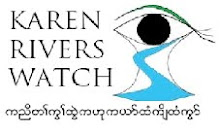Burmese Labor Minister Meets Labor Rights NGOs

Thousands of Burmese migrants work long hours for low wages at factories such as this one in Thailand. (Photo: Jacobbaynham)
The meeting was arranged as part of President Thein Sein’s three-day visit to Thailand where he focused mostly on cementing plans to proceed with the Dawei Special Economic Zone.
Accompanying Aung Kyi were Labour Affairs Coordinator Kyaw Kyaw Lwin and two other diplomats from the Burmese embassy in Thailand. The NGOs represented at the meeting were: the Foundation for Education and Development (FED); Burma Association Thailand (BAT); the Migrant Assistance Program (MAP Foundation); Indonesia’s Diponegoro University (UNDIP); and Mekong Migration Network.
The labor rights activists say they raised the issue of workplace violations. They said that many Burmese migrants complain that their Thai employers’ treatment of them remains unchanged despite the “legalization” of many migrant workers under the temporary passport scheme which was introduced in 2009.
Htoo Chit, the director of FED, said that the violation of work contracts is “a common problem,” in reference to the terms and conditions which migrant workers sign with their employers when they join the workforce.
Htoo Chit said he and other representatives of the NGOs highlighted this issue and similar problems to Burma’s labor minister, and that they expressed their opposition to the Thai government’s statement that it intended to begin deporting pregnant migrants.
Burmese workers continually face exploitation in Thailand’s factories despite attaining legal status in the form of temporary passports and work permits, he said.
During Burmese opposition leader Aung San Suu Kyi’s visit to the country in May, Thai Deputy Prime Minister Yuthasak Sasiprapa promised that Thailand would take better care of Burmese workers and increase their salaries, which are regularly paid at rates below the official Thai minimum wage.
Labor rights activists in Mae Sot said that wages had been increased marginally in that area, but that those migrants were still restricted from travelling outside the province to look for better-paying work.
Moe Gyo, the chairman of Mae Sot-based Joint Action Committee for Burma Affairs, said, “The travel restrictions set by the Mae Sot authorities have been informally imposed since the middle of May this year.”
At Tuesday’s meeting, Aung Kyi told the NGO representatives that Thai Prime Minister Yingluck Shinawatra had assured him that Thailand would “take care of Myanmar laborers in Thailand in a just manner and according to Thai laws.”
But Htoo Chit said that many Thai authorities are themselves opposed to the very laws they have created. “We urged the labor minister to talk about these concerns with the Thai government,” he said.
In Thailand, there are somewhere between 2 to 3 million Burmese migrants working mainly in factories, fisheries, agriculture and construction or as domestic workers.
Meanwhile, on Monday, 13 Burmese workers from a garment factory in central Thailand’s Nakorn Sawan province were punished for taking a day’s leave on Saturday.
Speaking to The Irrawaddy on Tuesday, one of the workers, Kyaw San Oo, said, “We are paid less than the wages stated in the contracts, and we must work six days a week. On Saturday, 13 of us took a day off and on Monday we were told not to come back to work for seven days.”
He said that according to their work contracts, the cost for a temporary passport and work permit should not have exceeded 10,000 baht (US $333). However, they each had to pay 12,000 baht, and 1,000 baht is deducted from their salaries every month to repay the outlay.
He said that, according to the work contracts that the 60 migrant workers have signed, the stated daily wage is 232 baht (US $7.75) plus additional earnings should be available through overtime. However, workers are paid by production and never paid overtime, he said.
“We only earn half of that wage,” said Kyaw San Oo. “This month I only earned 2,784 baht [$93] and was deducted 2,000 baht for my passport and work permit. This is not enough to live on.”










0 comments:
Post a Comment